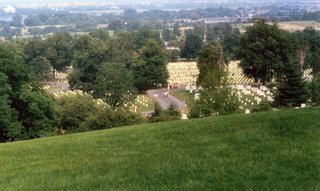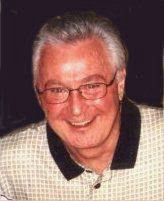 Here is a photo I took of Arlington National Cemetery in Washinton, D.C. For this Memorail Day weekend it seemed kind of appropriate. If you look toward the top left side of the shot, you can see the Jefferson Memorial and the Potomac River. A little history of the cemetery. Arlington Mansion and 200 acres of ground immediately surrounding it were designated officially as a military cemetery June 15, 1864, by Secretary of War Edwin M. Stanton. More than 300,000 people are buried at Arlington Cemetery.
Here is a photo I took of Arlington National Cemetery in Washinton, D.C. For this Memorail Day weekend it seemed kind of appropriate. If you look toward the top left side of the shot, you can see the Jefferson Memorial and the Potomac River. A little history of the cemetery. Arlington Mansion and 200 acres of ground immediately surrounding it were designated officially as a military cemetery June 15, 1864, by Secretary of War Edwin M. Stanton. More than 300,000 people are buried at Arlington Cemetery.Veterans from all the nation's wars are buried in the cemetery, from the American Revolution through the Iraq and Afghanistan. Pre-Civil War dead were reinterred after 1900. The federal government dedicated a model community for freed slaves, Freedman's Village, near the current Memorial Amphitheater, Dec. 4, 1863. More than 1,100 freed slaves were given land by the government, where they farmed and lived during and after the Civil War. They were turned out in 1890 when the estate was repurchased by the government and dedicated as a military installation.
In Section 27, are buried more than 3,800 former slaves, called "Contrabands" during the Civil War. Their headstones are designated with the word "Civilian" or "Citizen." Arlington National Cemetery and Soldiers Home National Cemetery are administered by the Department of the Army. All other National Cemeteries are administered by the Department of Veterans Affairs, or the National Park Service. Arlington House (Custis-Lee Mansion) and the grounds in its immediate vicinity are administered by the National Park Service. The flags in Arlington National Cemetery are flown at half-staff from a half hour before the first funeral until a half hour after the last funeral each day. Funerals are normally conducted five days a week, excluding weekends. Funerals, including interments and inurnments, average 28 a day.
I pray that our Heavenly Father may assuage the anguish of your bereavement, and leave you only the cherished memory of the loved and lost, and the solemn pride that must be yours, to have laid so costly a sacrifice upon the altar of Freedom.-- Abraham Lincoln, November 1864











